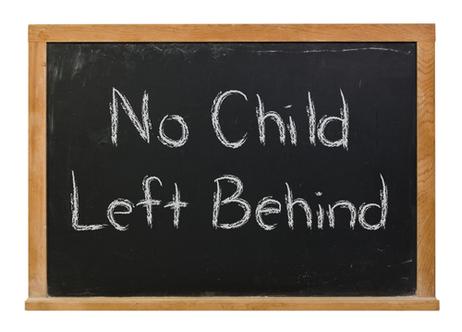The No Child Left Behind Act signed into law by President George W. Bush in 2001 promised to provide schools with the necessary incentives to raise the bar on the quality of education across the country. The bill emphasized stringent, standardized testing that would effectively identify underachieving schools. Those schools and school districts would be threatened with the prospect of limited funding if they did not bring their test scores up to the national average. The ultimate goal of No Child Left Behind was to ensure every student in the United States was reading and writing proficiently by 2014.
The Deadline is Looming
This year marks the deadline for many schools to bring their standards up to par or face significant funding cuts by the federal government. While the theory behind No Child Left Behind sounded good on paper, school officials are now seeing the problems with the act, as nearly 80 percent of the nation’s schools may receive a failing mark according to federal standards. This means that either the majority of schools in the country could lose important funding at a time when budget cuts are already impacting the quality of education in many districts.
The summer months have been a turbulent time for No Child Left Behind. On the one hand, Education Secretary Arne Duncan has hinted that he might relax standards – or provide waivers – to schools that are unable to make the grade before the next school year begins. On the other side, congress is protesting the act, saying that federal lawmakers need to be the ones to revamp the act to make it more realistic for the majority of school districts across the country. Throughout the controversy, one fact remains clear: the number of schools in jeopardy right now demonstrates the lack of effectiveness in the No Child Left Behind act as it currently stands, and the necessity to make dramatic changes in federal education standards as quickly as possible.
Disregard for Federal Law
With deadlines for No Child Left Behind looming, some states are choosing to take matters into their own hands. According to a report at Education Week, some states are planning to disregard the requirements of No Child Left Behind completely, choosing instead to set their own standards that will be much easier for their schools to meet. The states leading this movement include Idaho, Montana and South Dakota, which have all notified the Education Department of their plans to disregard the federal accountability law. However, the Education Department has not met this proposal with the proverbial open arms.
Justin Hamilton, spokesman for the Department of Education told Education Week, “We all agree NCLB is broken, and the best way to fix it is for Congress to send a bipartisan bill to the president to sign by the start of the school year. If Congress needs more time, our Plan B would be to offer relief in exchange for reform to states who desperately want flexibility from NCLB’s broken provisions. This will give all states the option of either complying with existing law, or participating in Plan B. One way or another, we need to enforce the law or change it.”
Are Waivers an Option?
As waivers become an option for states that won’t make the No Child Left Behind deadline, more states are considering this path until the law is adequately reformed. According to a report at the Nashville Business Journal, Tennessee may be one of the states that requests a waiver from the federal government. CBS Minnesota has also reported that more schools in Minnesota may consider this option as well. Since 2009, this state has received six waivers lifting the stringent requirements of No Child Left Behind on struggling schools. According to Minnesota officials, the waivers have been requested because the federal government has not moved quickly enough to reform the law.
Letter Sparks Controversy
In an effort to curb concern over No Child Left Behind, Education Secretary Arne Duncan has said he would relax some of the standards in the law to free states from potentially harsh consequences if requirements are not met. This promise has launched backlash on both sides of the aisle in Congress, as federal lawmakers balk at the removal of some of their authority in regards to education reform.
Senator Patty Murray (Dem-Washington) told the Miami Herald, “If we give over to the administration complete authority to determine from the rooftops what those requirements are going to be, I think we have not done our responsibility.” Democratic Sen. Tom Harkin from Iowa agreed. He added, “The best way to fix the problems in existing law is to pass a better one.”
Minnesota Republican John Kline from the House of Representatives sent a letter to Duncan, demanding that he give evidence of legal authority to make such changes to the existing law without the approval of Congress. Kline told the Herald, “He is not the nation’s superintendent.”
While the controversy continues to rage over what to do about No Child Left Behind, one fact remains clear – if this law is allowed to continue without any type of reform, the majority of schools across the country will be facing severe penalties for failure to live up to the standards of the bill. With budgets already stretched as tight as school districts can handle, it hardly seems appropriate to hand down further penalties until true education reform is finally passed by federal lawmakers.












